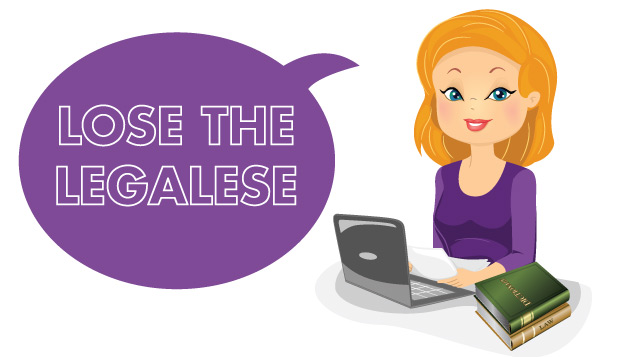 Why are so many legal briefs overwrought with stuffy, archaic verbiage where simple, plain English would do?
Why are so many legal briefs overwrought with stuffy, archaic verbiage where simple, plain English would do?
We can blame it in part on our legal education. Slogging through page after page of mind-numbing text—the sort comprising the typical, aged case featured in our law school books—can leave a lasting impression. It’s like the stuff invades and infects our brains.
In our practices, we tend to rely on ancient templates and forms. We fall into the habit of phrasing our points and ideas in the manner we found bewildering when we first encountered it, yet now gives us comfort—as if wielding these terms marks a right of passage and makes us sound like we know what we are talking about.
Truth is, it really doesn’t, and we need to knock it off at once—for the sake of our clients and the greater goal of making the law accessible to all.
Plus, consider this: judges “overwhelmingly” don’t like legalese.
As Bryan Garner tells us in The Winning Brief, polling of judges throughout the country shows “they consider lawyers who use legalese to have little prestige, to be less smart, and to be lower in their academic rankings.”
Ouch.
While “letting go of some cherished phrases” may be difficult, Garner and his fellow leaders in the Plain English movement say we’ll find that “not only will we communicate more effectively,” we will “think more clearly,” too.
This isn’t about legitimate terms of art, like say, res ipsa loquitur. We’re talking about “lawyerisms”—words like aforementioned, whereas, herein, said, and such that convey little meaning, legal or otherwise, and serve no substantive purpose. Using them makes us sound pompous and worse, can create ambiguity.
Take, for example, the word said, when placed in front of a noun in lieu of the, this, these, or those (as in “said agreement” or “said law”). Some lawyers believe using said in this way is more precise. They are mistaken. If the writer has discussed more than one agreement, then said does not specify which agreement is meant. And if only one has been referenced, then said is unnecessary. Such, used to mean, “the one just noted” has the same problems, as does the stiff and clunky, aforementioned.
The goal is to stop using certain words in the manner peculiar to our profession—and to excise any word that does not instantly convey meaning to the lay person.
Remember the maxim that Richard Wydick, another leader in the Plain English movement, has passed along to us: “Good legal writing should not differ, without good reason, from ordinary well-written English.”
About the author:
Savannah Blackwell is a former news reporter who covered government and politics for more than a decade, mostly in San Francisco. She became a licensed California attorney in 2010 and specializes in legal research and writing. She can be reached at savannah.blackwell@gmail.com. Follow her on Twitter at @SavannahBinSF.


